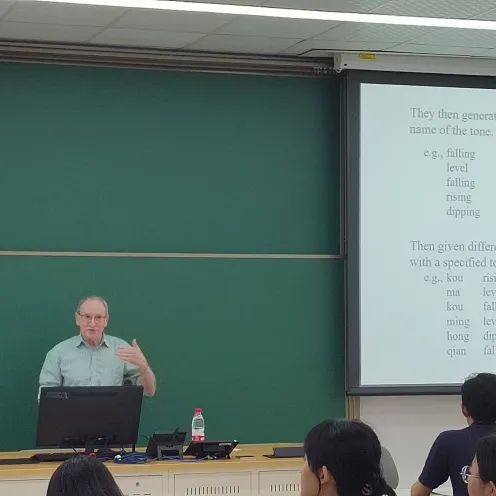From May 6th to June 3rd, 2023, Distinguished Professor Marcus Taft from the University of New South Wales, Australia, conducted a one-month residency at our institution's base. During his residency, Professor Taft collaborated extensively with the base's research personnel and conducted a series of academic activities for our university's faculty and students, receiving a warm welcome from all.

1. Teaching Graduate International Courses:** Professor Taft delivered a short-term course for the base's graduate students, and some outstanding students from our university's "Chinese International Communication" program also attended. Professor Taft meticulously designed the course content, which comprised three sessions with the following themes: "Phonology in Visual Word Recognition," "Character recognition in Chinese," and "Complex Word Recognition." During these sessions, Professor Taft introduced his research findings in the fields of vocabulary and psycholinguistics, focusing on topics such as the consistency effect of homophones in English lexical access, the representation of free morphemes and agglutinative word speed at the lemma level, and the impact on whole-word access and the semantic transparency of opaque Chinese compound words. Professor Taft's engaging and humorous teaching style, coupled with his in-depth explanations of his research in vocabulary processing, sparked students' research interests and prompted deeper contemplation.
2. Organizing Academic Lectures:** On May 24th, 2023, Professor Marcus Taft delivered an insightful academic lecture to our university's faculty and students. The lecture was titled "Some Thoughts on Chinese Tones: Mental Representation and Second-language Teaching" and drew an audience of over 40 individuals. Professor Taft's presentation comprised two main parts: firstly, he introduced the "mental representation of tones" by incorporating multiple experiments in speech production and phonetic judgment; secondly, he discussed tone learning in Chinese as a second language and shared his innovative "TAFT" method for learning Chinese tones, which involves using letters to represent tone marks inserted after vowels, e.g., "Yihng," "Yiwng," "Yiyng," corresponding to the second, third, and fourth tones. Professor Taft's subsequent research indicated that the TAFT system is more helpful for Chinese as a second language learners in tone memory. The lecture combined both theory and practical methods, providing valuable insights to those in attendance.
3. "Dialogue with Experts" Academic Interview:** On May 25th, 2023, Professor Taft participated in an "Expert Dialogue" academic interview, following an invitation from the base's research association. During the event, students raised questions and concerns related to their studies and research, such as the relationship between behavioral experiments and brain imaging research, the challenges of maintaining pure behavioral research in the current trend of brain imaging studies, integrating cognitive mechanisms of language acquisition into real second-language classroom teaching, and dealing with non-significant experimental results. Professor Taft offered comprehensive and detailed answers to each inquiry, providing valuable advice for students' academic development. The academic interview fostered a stimulating atmosphere of idea exchange and lively interaction.
4. Academic Collaboration with Base Researchers:** Professor Taft engaged in in-depth academic discussions and collaborated on research projects with several base researchers, including Associate Researcher Yang Qun, Associate Researcher Li Le, and Dr. Wei Yanjun, among others. Professor Taft made significant contributions to enhancing the research capabilities of the base and producing high-quality academic outcomes.
During his residency at the base, Professor Marcus Taft not only conducted classroom teachings and mentored graduate students but also actively engaged in profound discussions with students, patiently addressing their queries. In fields such as conducting experimental research, writing research papers, data analysis, and effectively managing the relationship between research and teaching, Professor Taft provided profound insights and new perspectives, offering valuable academic guidance and advice to the students. Base students expressed their immense appreciation for the knowledge they gained, noting that their international academic perspectives had been enriched, and they now had greater interest and motivation for pursuing scientific research in the future.